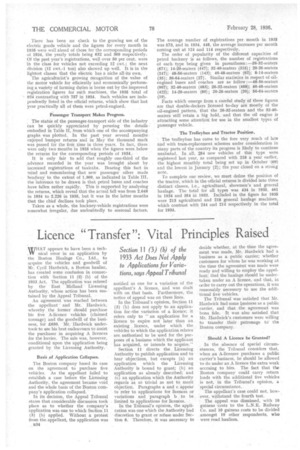Licence "Transfer": Vital Principles Raised
Page 48

If you've noticed an error in this article please click here to report it so we can fix it.
Section 11(3) (b) of the 1933 Act Does Noi Apply to Applications for Variations, says Appeal Tribunal WHAT appears to have been a technical error in an application by the Boston Haulage Co., Ltd., to acquire the vehicles and goodwill of Mr. Cyril Hardwick, a Boston haulier, has created some confusion in connection • with Section 11 (3) (b) of the 1933 Act. The application was refused by the East Midland Licensing Authority, whose action has been sustained by the Appeal Tribunal.
An agreement was reached between the appellant ' and Mr. Hardwick, whereby the former should purchase his five A-licence vehicles (claimed tonnage) and the goodwill of the business, for 650. Mr. Hardwick undertook to use his best endeavours to assist the purchaser in acquiring A licences for the lorries. The sale was, however, conditional upon the application being granted by the Licensing Authority.
Basia ,of Application Collapses.
The Boston company based its case on the agreement to purchase five vehicles. As the appellant failed to establish a case before the Licensing Authority, the agreement became void. and the whole basis of the Boston company's application collapsed.
In its decision, the Appeal Tribunal states that considerable discussion took place as to whether the company's application was one to which Section 11 (3) (b) applied. Without a protest from the appellant, the application was . B34 notified as one for a variation of the appellant's A licence, and was dealt with on that basis. Furthermore, the notice of appeal was on these lines.
In the Tribunal's opinion, Section 11 (3) (b) does not applY to an application for 'the variation of a licence; it refers only to "an application for a licence to expire not later than an existing licence, under which the vehicles to which the application relates are authorized to be used for the purposes of a business which the applicant has acquired, or intends to acquire.”
Section 11 directs the. Licensing Authority to publish application and to hear objections, but excepts (a) an application which the Licensing Authority is bound to grant; (b) an application as already described; and (c) an application which the Authority regards as so trivial as not to merit objection. Paragraphs a and c appear to refer to applications for licences or variations and paragraph b to be limited to applications for licences.
In the Tribunal's opinion, the application was one which the Authority had discretion to grant or refuse under Section 6. Therefore, it was necessary to decide whether, at the time the agreement was made, Mr. Hardwick had a business as a public carrier; whether customers for whom he was working at the time the agreement was made were ready and willing to employ the appellant; that the haulage should be undertaken under an A licence, and that, in order to carry out the operations, it was reasonably necessary to use the additional five vehicles.
The Tribunal was satisfied that Mr. Hardwick had some business as a public carrier, and that the agreement was bona fide. It was also satisfied that Mr. Hardwick's customers were willing to transfer their patronage to the Boston company.
Should A Licence be Granted?
In the absence of special circumstances, the Tribunal considers that, when. an A-licensee purchases a public carrier's business, he should be allowed to do under an A licence the extra work accruing to him The fact that the Boston company could carry return loads with the additional five vehicles is not, in the Tribunal's opinion, a special circumstance.
The appellant's case could not, however, withstand the fourth test.
The appeal was dismissed, with 10 guineas costs to the L.N.E. Railway Co. and 10 guineas costs to be divided amongst 19 other respondents, who were road hauliers.




























































































